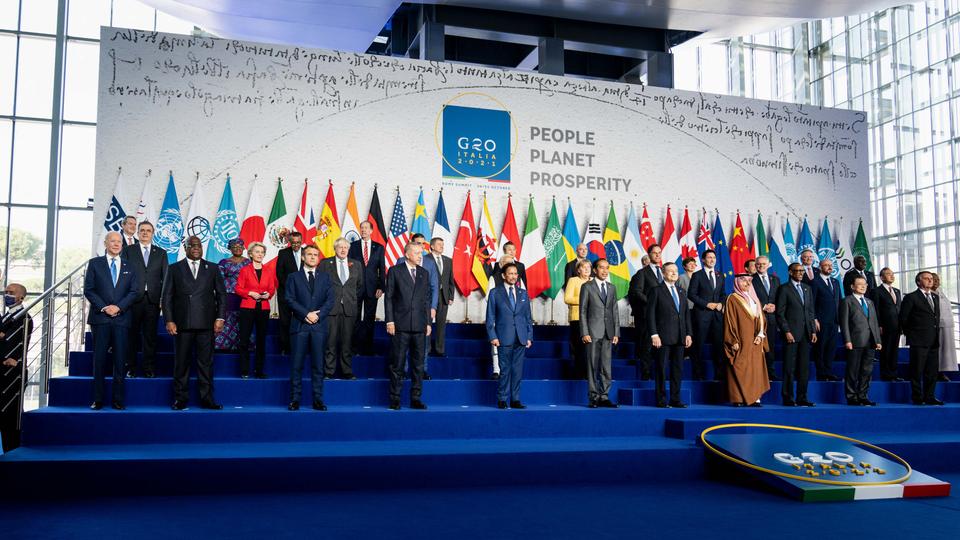Rich countries have used vaccines and stimulus spending to restart economic activity, leaving the risk that developing countries that account for much of global growth will remain behind due to low vaccinations and financing difficulties.

Italian Premier Mario Draghi made a sharp call to pick up the pace in getting vaccines to poor countries as he opened a conference of the world’s powerhouse economies, calling the gaping global Covid-19 vaccine gap “morally unacceptable.”
Draghi, the host of the two-day Group of 20 summit in Rome, said on Saturday that only three percent of people in the world’s poorest countries are vaccinated, while 70 percent in rich countries have had at least one shot.
“These differences are morally unacceptable and undermine the global recovery,” said Draghi, an economist and former chief of the European Central Bank.
Italian sources said many leaders in their discussions Saturday stressed the need to boost transfer of technologies in areas like Africa to be ready for any future health emergencies.
Rich countries have used vaccines and stimulus spending to restart economic activity, leaving the risk that developing countries that account for much of global growth will remain behind due to low vaccinations and financing difficulties.
UN Secretary General-General Antonio Guterres has underlined that rich countries have spent 28 percent of annual economic output on pandemic recovery, while the figure is two percent for the poorest nations.
French President Emmanuel Macron has pledged to use the summit to press fellow European Union leaders to be more generous in donating vaccines to low-income countries.
But advocates of civil society which have held discussions with G-20 officials before the summit were skeptical of the donation approach.
The UN World Health Organization has backed a goal of 40 percent global vaccination this year and 70 percent in 2022.
“Without suspension of (vaccine manufacturers’) patents, how will it be possible to reach” that target, Stefania Burbo, of Civil 20, told reporters as world leaders huddled in a Rome convention center a few blocks away on strategy to emerge from the pandemic.
READ MORE:
Activists rally urging G20 leaders to halt global vaccine inequality
Global economic recovery
Climate change, the pandemic recovery and international taxation were other issues challenging leaders at their first in-person summit since the pandemic took hold in early 2020.
The summit is confronting what is tantamount to what has been playing out as two-track global recovery in which rich countries are bouncing back faster.
Macron has told reporters he expects the G-20 to confirm an additional $100 billion to support Africa’s economies.
The money would be provided via the reallocation of part of $650 billion worth of special drawing rights, a foreign exchange tool used to help finance imports issued by the International Monetary Fund.
The idea is for countries that don’t need the help to reallocated their special drawing rights to those that do. Participants were to include African Union President Felix Tshisekedi and Rwandan President Paul Kagame. The heads of state of South Africa and Senegal, Cyril Ramaphosa and Macky Sall, will take part via videoconference, the French presidency said.
Italy is hoping the G-20 will secure crucial commitments from countries representing 80 percent of the global economy.
Climate change
G20 nations are responsible for around 80 percent of global carbon emissions.
Most of the leaders who were in Rome will head to Glasgow, Scotland for the UN climate conference as soon as the G-20 ends on Sunday afternoon.
Russian President Vladimir Putin and Chinese leader Xi Jinping, whose efforts to reduce emissions are paramount to combatting climate change, were participating remotely in the Rome summit.
READ MORE: G20 still hooked on fossil fuels despite ‘green recovery’ pledges
A recent UN environment report concluded that announcements by dozens of countries to aim for “net-zero” emissions by 2050 could, if fully implemented, limit a global temperature rise to 2.2 degrees Celsius.
That’s closer but still above the less stringent target agreed in the Paris climate accord of keeping the temperature increase to well below 2 degrees Celsius compared with pre-industrial times.
The G-20, though, will likely be a celebration by participants of one agreement, on a global minimum corporate tax.
The G-20 leaders are expected to formally affirm their commitment to establishing a 15 percent global minimum corporate tax rate by 2023, a measure aimed at preventing multinational companies from stashing profits in countries where they pay few or no taxes.
Source: TRTWorld and agencies
G-20 Summit opens with call for more vaccines for poor nations
Source: News Achor Trending
0 Comments